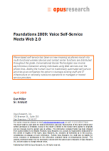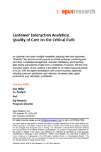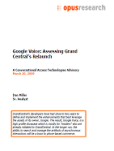
Featured Research
Phone-based self-service has taken on new meaning as phones morph into multi-functional wireless devices and contact center functions are distributed throughout the globe. Conversational Access Technologies now involve asynchronous interaction among individuals using Web services over the phone lines. Adding the human touch to traditionally automated self-service activities gives companies the option to leverage existing staff and IT infrastructure or outsource operations to managed or hosted service providers.
Featured Research Reports are available to registered users only.
For more information on becoming an Opus Research client, please contact Pete Headrick (pheadrick@opusresearch.net).


 As customer care spans multiple modalities requiring real-time responses, “Analytics” has become an all-purpose word that embraces monitoring and recording, knowledge management, business intelligence, word spotting, data mining and analysis of data from a multiplicity of sources. Yet the most important aspect of new systems is the ability to correlate measured activity in ACDs, IVRs and agent workstations with overall business objectives, including customer satisfaction and retention, increased sales, agent productivity and, ultimately, profitability.
As customer care spans multiple modalities requiring real-time responses, “Analytics” has become an all-purpose word that embraces monitoring and recording, knowledge management, business intelligence, word spotting, data mining and analysis of data from a multiplicity of sources. Yet the most important aspect of new systems is the ability to correlate measured activity in ACDs, IVRs and agent workstations with overall business objectives, including customer satisfaction and retention, increased sales, agent productivity and, ultimately, profitability. 






